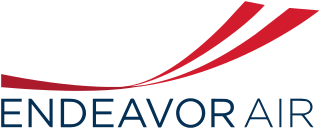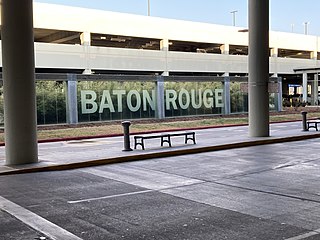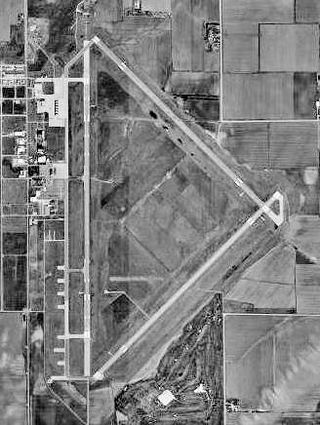
Endeavor Air is an American regional airline headquartered at the Minneapolis–Saint Paul International Airport in Minneapolis, Minnesota, United States. The airline is a wholly owned subsidiary of Delta Air Lines and staffs, operates and maintains aircraft used on Delta Connection flights that are scheduled, marketed and sold by Delta Air Lines.
Mesaba Aviation, Inc. was a regional airline in the United States that operated from 1944 until 2012, when it merged with Pinnacle Airlines to form Endeavor Air. It was based in Eagan, Minnesota From 2010 to 2012 the airline was a wholly owned subsidiary of Pinnacle Airlines Corp. with code sharing flights operated as Delta Connection for Delta Air Lines and US Airways Express for US Airways. Previously, the airline operated code sharing service as Northwest Airlink and Northwest Jetlink on behalf of Northwest Airlines which subsequently merged with Delta. Mesaba also previously operated connecting flight services in association with Republic Airlines before this air carrier was subsequently merged into Northwest. Mesaba Airlines effectively ceased operations on January 4, 2012, when all aircraft and personnel were transitioned to the Pinnacle Airlines operating certificate. Mesaba's operating certificate was surrendered on July 31, 2012.
America West Express was the brand name for America West Airlines commuter and regional flights operated by Mesa Air Group's Mesa Airlines under a code share agreement. Today Mesa Airlines operates for American Eagle.
Mesa Airlines, Inc., is an American regional airline based in Phoenix, Arizona. It is an FAA Part 121–certificated air carrier operating under air carrier certificate number MASA036A issued on June 29, 1979. It is a subsidiary of Mesa Air Group and operates flights as United Express via respective code sharing agreements with United Airlines. It serves more than 180 markets in the Western Hemisphere. In a 1997 article from the Journal of Air Transportation, Mesa's safety record was noted as having the fewest incidents among domestic regional airlines at that time. Mesa filed for Chapter 11 bankruptcy in January 2010, hoping to shed financial obligations for leases on airplanes it no longer needed and emerged from bankruptcy in March 2011. In November 2017, Mesa opened a new training center in Phoenix. The 23,000-square-foot facility features a full-size CRJ-200 cabin trainer aircraft, 14 classrooms, and has the capacity to train 300 crew members at one time.

Corpus Christi International Airport is 6 miles west of Corpus Christi, in Nueces County, Texas. It opened in 1960, replacing Cliff Maus airport at 27.767°N 97.44°W, where the Lozano Golf Center is now located.

Baton Rouge Metropolitan Airport, also known as Ryan Field, is a public use airport located four miles (7 km) north of the central business district of Baton Rouge, a city in East Baton Rouge Parish, Louisiana, United States.

Mesa Air Group, Inc. is a Nevada Corporation commercial aviation holding company with headquarters in Suite 700 at 410 North 44th Street in the Camelback East area of Phoenix, Arizona, United States. The company operates one regional airline subsidiary: Mesa Airlines which operates as United Express and as American Eagle under contractual agreements with United Airlines and American Airlines respectively.

Central Nebraska Regional Airport is three miles northeast of Grand Island, in Hall County, Nebraska. It is owned by the Hall County Airport Authority. The airport sees two airlines, Allegiant Air which flies independently and American Eagle which is subsidized by the federal Essential Air Service program. In 2016 the airport had 68,879 passenger boardings (enplanements), a 6.6% increase from the 64,602 enplanements in 2015. The airport had 7,961 enplanements in calendar year 2008, 20,136 in 2009 and 37,101 in 2010.

Santa Fe Regional Airport is a public use airport in Santa Fe, Santa Fe County, New Mexico, United States, 10 miles (16 km) southwest of the city center. The airport serves the greater Santa Fe and Los Alamos areas.

Flagstaff Pulliam Airport is 5 miles south of Flagstaff, in Coconino County, Arizona, United States. The airport is serviced by American Eagle, and is also used for general aviation. The National Plan of Integrated Airport Systems for 2011–2015 called it a "primary commercial service" airport. It is the closest airport to Grand Canyon National Park with scheduled passenger service from a major airline.

Durango–La Plata County Airport is a city- and county-owned public airport 12 miles southeast of Durango, in La Plata County, Colorado.

Columbia Regional Airport is a commercial passenger airport serving Columbia, Missouri. Located about 12 miles (19 km) southeast of Columbia in Boone County, Missouri, it is the only commercial airport in Mid-Missouri and also serves the state capital of Jefferson City. As of 2022, commercial passenger service is provided by American Airlines subsidiary American Eagle. The airport opened in 1968, replacing the Columbia Municipal Airport off of Interstate 70. It is frequently used for charter flights by college athletic teams visiting the University of Missouri and for MU team flights.
ExpressJet Airlines was a regional airline in the United States that operated from 1987 until 2022. It was headquartered in College Park, Georgia. The company began as Britt Airways and flew exclusively as Continental Express, the contracted codeshare partner for Continental Airlines. The name was changed to ExpressJet at the beginning of 1995 as the company began acquiring Regional jets, replacing its fleet of turboprop aircraft. Along with flying as Continental Express, ExpressJet expanded flying under the Delta Connection brand from 2007 through 2008 and again from 2012 through 2018. Service as American Eagle was flown between 2012 and 2019 and service under the United Express brand began in 2009. ExpressJet also flew an independent operation under their own brand in 2007 through 2008. When Continental Airlines merged into United Airlines in 2012, the Continental Express operations were added to the United Express service. In September 2020, it exited the fee-for-departure airline market and temporarily ceased flights after the conclusion of its contract with its sole remaining mainline partner, United Airlines. In September 2021, ExpressJet resumed operations as both an air charter provider and a regional airline under its own brand aha!—short for "Air-Hotel-Adventure." The brand's route structure focused on the West Coast of the United States with a hub at Reno-Tahoe International Airport, and scheduled flights began on October 24, 2021. The airline, including its brand aha!, filed for bankruptcy on August 23, 2022, having ceased all operations the previous day. In July 2023, the airline announced plans to relaunch as an air charter service using a single leased Boeing 777.
GoJet Airlines LLC is a regional airline headquartered in Bridgeton, Missouri, United States. Wholly owned by Trans States Holdings, it has 1,670 employees. It operates commuter feeder services under the United Express brand of United Airlines. United Express flights are currently operated out of United's hubs at Chicago–O'Hare, Newark and Washington-Dulles. GoJet's Delta Connection branded flights came to an end on March 31, 2020. Most of the flying at the end of the agreement was out of Detroit and Minneapolis–St. Paul as well as Raleigh-Durham. GoJet Airlines' system operations center (SOC), training center and corporate offices are co-located in the former Trans World Airlines and Ozark Airlines training center in Bridgeton, Missouri. The airline uses the former McDonnell Douglas factory hangar at Saint Louis Lambert International Airport as its primary maintenance facility, with maintenance staff available at all of the airline's destinations. Its call sign, "Lindbergh", is named for aviation pioneer Charles Lindbergh, who flew the Spirit of St. Louis solo across the Atlantic Ocean in 1927: the first person to do so.

Martha's Vineyard Airport is a public airport located in the middle of the island of Martha's Vineyard, three miles (5 km) south of the central business district of Vineyard Haven, in Dukes County, Massachusetts, United States. This airport is owned by Dukes County and lies on the border between the towns of West Tisbury and Edgartown.

Tupelo Regional Airport is a public use airport located 3.7 miles; 3.2 nautical miles (6 km) west of the central business district of Tupelo, a city in Lee County, Mississippi, United States. It is owned by the Tupelo Airport Authority. The airport is mostly used for general aviation, but is also served by one commercial airline with scheduled passenger service subsidized by the federal Essential Air Service (EAS) program. Many college football teams visiting the University of Mississippi, 49 miles west in Oxford, fly into Tupelo.

Compass Airlines, LLC, was a regional airline in the United States that operated from 2006 to 2020, when it shut down due to the COVID-19 pandemic. It was headquartered in Delta Air Lines Building C at Minneapolis–Saint Paul International Airport in Fort Snelling, Hennepin County, Minnesota; prior to December 16, 2009, it was headquartered in unincorporated Fairfax County, Virginia, United States, east of the Chantilly CDP. The airline launched inaugural service with a single Bombardier CRJ-200 aircraft under the Northwest Airlink brand between Minneapolis/St. Paul and Washington, D.C., on May 2, 2007. On August 21, 2007, it began flying two Embraer E175 76-passenger aircraft, and expanded to 36 aircraft by December 2008.

The Bombardier CRJ550, CRJ700, CRJ705, CRJ900, and CRJ1000 are a family of regional jet airliners that were designed and manufactured by Canadian transportation conglomerate Bombardier between 1999 and 2020. Their design was derived from the smaller CRJ100 and 200 airliners, the other members of the Bombardier CRJ aircraft family. The CRJ program was acquired by the Japanese corporation Mitsubishi Heavy Industries in 2020, which ended production of the aircraft.

Chautauqua Airlines, Inc. was an American regional airline and a subsidiary of Republic Airways Holdings based in Indianapolis, Indiana, United States. Prior to the shut down of operations, it operated scheduled passenger services to 52 airports in the United States and Canada via code sharing agreements as the Delta Connection for Delta Air Lines, AmericanConnection for American Airlines, and United Express for United Airlines. Chautauqua previously flew feeder services for other airlines via code sharing agreements including Allegheny, USAir, TWA, Continental, Frontier, and America West. Its last day in operation was December 31, 2014, at which time all flying was absorbed by the Shuttle America certificate.
Delta Connection is a brand name for Delta Air Lines, under which a number of individually owned regional airlines primarily operate short- and medium-haul routes. Mainline major air carriers often use regional airlines to operate services via code sharing agreements in order to increase frequencies in addition to serving routes that would not sustain larger aircraft as well as for other competitive or operational reasons.














